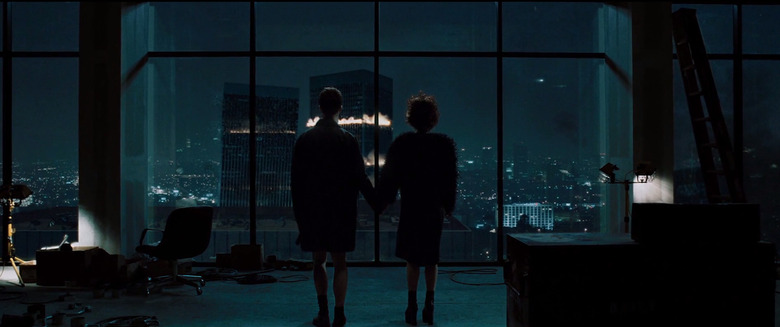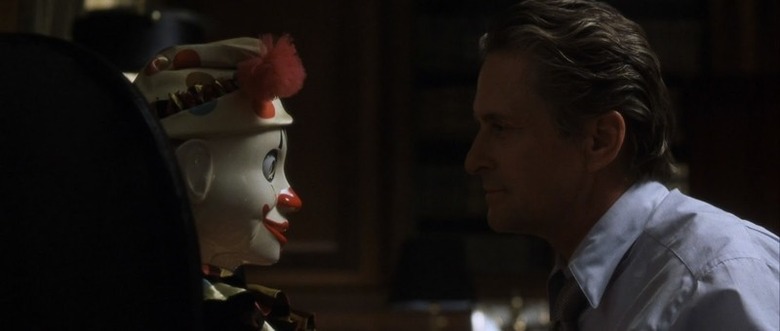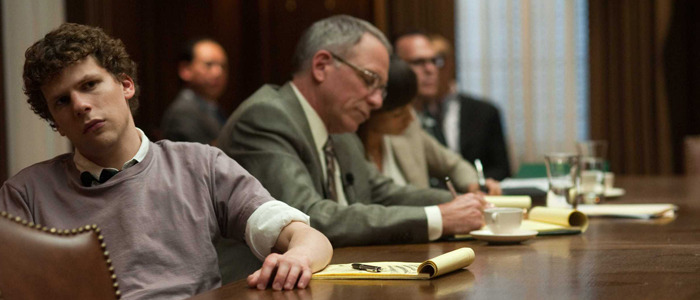Three Great David Fincher Audio Commentaries
The start of a David Fincher commentary is kind of like the start of a David Fincher movie: you know you're in store for something good. Sometimes after listening to hours upon hours of commentary tracks, I question how I spend my time, but listening to Fincher's commentaries is always time well spent. He's concise and candid, he's as funny as his movies, and he's a great storyteller. The co-founder of Propaganda Films is completely open about his choices and how a scene and film was put together, and never attempts to preserve some sense of mystery about his work.
Everything you'd want to know about one of Fincher's movies can be learned in one of his commentary tracks, which are usually joined by other excellent and informative bonus features, including a highly reccomended Panic Room commentary featuring screenwriter William Goldman. Audio commentaries don't get much better than Fincher's, though, so if you've yet to listen to one of his, do yourself a favor and check one out.
Fight Club (Featuring David Fincher, Edward Norton, Brad Pitt, and Helena Bonham Carter)
Why Listen: Fincher never shies away from discussing any criticisms his movies might've received. In the case of Fight Club, the director, Norton, and Pitt spend a great time of time recalling the initially polarizing reception of the Chuck Palahniuk adaptation and responding to criticisms. They even get into Rosie O'Donnell's not-so-kind thoughts on the movie. Apparently, she disliked the movie enough to spoil the ending on national television. "Unforgivable," Pitt remarks. The star of Fincher's Se7en and my favorite Heineken commercial brings a lot of laughs to this commentary, as he did with his Ocean's 11 commentary track. Pitt digs into some nuances of the movie, too, often pointing out some of the movie's more subtle details, which made me further appreciate Fight Club. It's Helena Bonham Carter who summarizes the experience of working with Fincher the best, though, when she mentions all the takes he does: "You never walk away from something thinking you haven't gotten it."What's Said: Fincher and screenwriter Andrew Kevin Walker (Se7en) have worked together several times, including on Fight Club. Walker didn't get the screenwriting credit he deserved thanks to the Writers Guild, so Fincher named the three detectives attacking Jack after the writer:
Fincher: We've been through this so many times with the Writers Guild. Andy rewrote The Game, and the Writers Guild won't even let you put "special thanks." It's a guild thing. So, we spaced it into the titles.
Pitt: That makes no sense to me.Norton: His contribution was so huge.Fincher: Don't get me started on the Writers Guild. We decided to bury his name. So, it's Detective Andrews, Detective Kevin, and Detective Walker.
Critics had a problem with the scene, saying at the time "that would never happen." Again, that sounds like the point from Fincher, who adds the scene was difficult and took longer than he expected. "Ain't that the way it goes?" Pitt asks, to which the director replies: "Always."
A Day on the Job: In addition to the Writers Guild, Fincher has issues with the MPAA and ratings boards. The still grueling and visceral scene where Jack demolishes Angel Face's (Jared Leto) face wasn't a fan favorite moment for the British censors. To Norton, it's the sound of the loud and unflinching hits that makes the scene more graphic. Fincher agrees and adds the context does as well:
Fincher: The British film sensors came back and said, "We find the scene Angel Face gets beaten up goes on a little too long." Well, that's the point. The point of the scene is you set up the rules of Fight Club, set up how people are supposed to react and what they're supposed to do, and this guy breaks the rules. They're horrified [in the room].
Norton: I also think this little piece of spice you had to add in of Jared's face gurgling probably didn't help matters.Fincher: [Laughs] They didn't ask us to take that out. It was just the punches.Trivia: After the travel montage when the narrator meets Lloyd the bartender, Fincher wanted the kitchen staff to look like the people in the picture of Robert Kennedy shot and lying on the kitchen floor of the Ambassador Hotel.
The Game (Featuring David Fincher, Michael Douglas, Cinematographer Harris Savides, and More)
Why Listen: This is probably Fincher's most personal commentary track. It's the one track of his where you feel you learn a little bit about him beyond who he is as a filmmaker. His attention is almost always on what he's showing the audience, but every once in a while, he opens up about how he relates to Nicholas Van Orton (Michael Douglas), who he sees as a modern-day Scrooge. For the most part, though, he delves into the idea of making a movie about movies and what the audience needs to see. The director is joined by an array of collaborators who, like Fincher, always bring entertainment and substantial comments to the commentary – especially Douglas. The actor worked almost everyday in the 108-day shoot, so he has some great anecdotes and stories to share, like trying to bring more comedic relief to the dramatic thriller, which Fincher "fears."What's Said: Fincher – who believes there's only one right place to put the camera – was extra cautious and careful with the "cinematic engineering" of The Game. He didn't want the camera, for example, to misdirect the audience too much with too many close-ups. Fincher wonders if he's overthinking things, but he illustrates why these sort of decisions are crucial:
You have control over everything people see and hear for two hours. Every single thing. The audience knows you can show them anything. They know you have computers and can show a Tyrannosaurus Rex eat a car, so they know you can do anything. The question is: what don't you do, not what do you do. Every time you go to a close-up the audience knows, subconsciously, you've made an editorial decision and said, "Look at this, this is important." In a movie like this where everyone is lying, you can run an audience ragged by showing them things that are supposedly important. Everything that's a close-up is important, whether it's important or not. When you cut to a close-up of somebody's face, you're doing it for a reason. There's no choice in the matter. It's not like you can say, "Oh yeah, I meant to do it on this one." You can do it as a red-herring or do it before you really want to before you set up what you really want to do or do it afterwards, but every time you underline something – and a close up is underlining – the audience is aware of it and starts to catalogue them. They know this movie is going to have suspense and mystery, and you don't want to exhaust that.
A Day on the Job: Michael Douglas is a great actor and a great movie star. He even sounds like a movie star, so all his comments in The Game are highly listenable. Douglas says Fincher has tremendous respect for actors, while other directors have a love-hate relationship with actors, sometimes hate how much they get paid, and can sometimes dissipate an actor's energy.
According to Douglas, this is one reason why Fincher respects actors:
One of the worst frustrations for an actor is to be called to the set after no matter how long the waiting had been for lighting and not to have your time. As you get there, there's one last tweaking of lights that has to be done. It's a real ego thing, I've learned now, and I used to be more forgiving about it, but now I'm not. I resent it. Everyone needs their time. You as cameraman can have as long as you want. The one thing I asked of David before we started, "When I come in there and call me, I'll be right there and it's our time." He was great that way, and Harris was great. You'd arrive, and that was your time. You could do rehearsals, you could shoot, but it was for you. Too many times you do pictures where because they're rushing, the cameraman, they'll say call them [the actors] in, but their idea is, "I'll just over overlap as they come in, do my tweaking of lighting." It's very disconcerting, because it doesn't allow the actor to take stage. An actor needs, even before the camera rolls, to take stage and have that moment to center themselves and be the center of attention. They need that energy.
Trivia: There was originally a love story, but when the super rich protagonist got into a carriage, Fincher called "bullshit."
The Social Network (Featuring David Fincher)
Why Listen: Something especially enjoyable about Fincher's commentaries is he's one of the few directors who will criticize his own work and say when he felt uncertain. One example: When Eduardo (Andrew Garfield) freezes the bank account, he says they could never decide on the degree of how upset he should look. Fincher can alway easily explain the intent of every one of his shots, but he also always explains what made him cautious or (rarely ever) uncertain. The director, who believes he owes it to himself as "a filmmaker and content provider" to have the word "necrophilia" in a PG-13 movie, again leaves no stone unturned as he recalls making his most fast-paced movie. You'll never tire of hearing Fincher talk about working with screenwriter Aaron Sorkin, composers Trent Reznor and Atticus Ross, and the cast.What's Said: Fincher hadn't originally thought Reznor scoring the movie, but after casting and prepping the movie, he started listening to the Nine Inch Nails' album Ghosts, which got him thinking, "Maybe this is the sound of the [movie's] world." In their earliest conversation Fincher told Reznor to think along the lines of Risky Business or a John Hughes movie since The Social Network is a coming of age movie, and also not to shy away from synthesizers.
Fincher explains why Reznor was a kindred spirit for the drama:
Here's the competition of the triadic and "Hand Covers Bruise." This is the final assertion of this theme [when Eduardo tells Mark to "lawyer up, asshole"], and again it's that weird, creepy anxious energy that has this piano melody that's very innocent. Now, it's almost an echo of its innocence, and that's really what this movie is about: a loss of innocence for everyone involved. I think Trent and Atticus came up with something that so helped tell this story. It's funny, when I contacted Trent and we started talking about the movie, originally I think he was like, "Oh, the Facebook movie?" Then I sent him the script and he was intrigued and I started showing him the scenes. I needed to have a collaborator who was a technologist, to a certain extent, and a great communicator. He communicates a kind of anger, he communicates a kind of dissatisfaction, or a kind of need or want for the world, or art, or music to be a certain way, and I needed that for Mark Zuckerberg. I needed that to be a part of the tapestry of it.
A Day on the Job: When The Social Network came out there was some debate over the creative licenses the movie took with Mark Zuckerberg's story. One journalist simply couldn't get onboard with the idea of dramatizing a recent story – an exchange from a press day Fincher recounts:
I was in Paris doing press and got into sort of a heated exchange with a journalist, who took great umbrage with the notion we had taken any dramatic license with creating dialogue and scenes for a character who was readily available to ask what got said and was only 26 or 27, so his memory should be good, and it was inexcusable for us to create any drama outside of what really happened. I said, "To what end? What would that conversation buy us?" He said, "A way more humane look at him as a person." I said, "To my knowledge, the greatest liberties we've taken was him trying to give an apology to the girl he wrote about on his blog at the beginning of the movie and trying to friend her at the end of the movie. So, the things we've created that you've taken the biggest issue with, to my mind, are actually things that make him human." He had no response.
Trivia: The shot of Zuckerberg's feet tapping in flip-flops during the meeting was a nod to the title sequence from My Three Sons.



